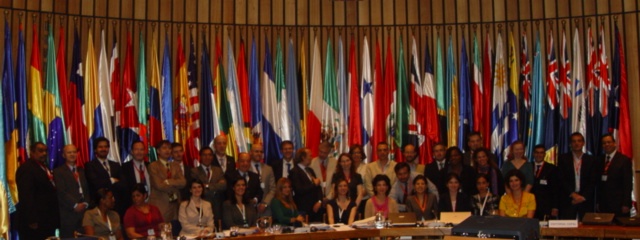Countries Approve Road Map for Regional Instrument on Access to Environmental Information, Participation and Justice
Latin American and Caribbean nations agree to strengthen regional cooperation and dialogue on environmental matters.

(7 November 2012) Today at the ECLAC headquarters in Santiago, Chile, delegates of the signatory countries to the Declaration on the application of Principle 10 of the Rio Declaration on Environment and Development finished a meeting where they agreed on a road map for its full implementation at the regional level.
Country representatives welcomed Brazil's signature on the Declaration and agreed on a road map towards a regional instrument on rights of access to environmental information, participation and justice, which are enshrined in Principle 10 of the Rio Declaration on Environment and Development approved in 1992.
The document was approved at the end of the First meeting of the focal points appointed by the Governments of the signatory countries of the Declaration on the application of Principle 10 of the Rio Declaration on Environment and Development in Latin America and the Caribbean.
In the text, delegates declare that information forms the cornerstone of all free and democratic societies, and that it is essential to take active measures to bring environmental information into the public domain, doing everything possible to guarantee ready, rapid, effective and practical access to that information.
They also recognize that it is essential to promote participation by all sectors of society in furthering the issues that form the region's environmental agenda.
According to the road map approved by signatory countries, the main aims of the regional instrument must be to achieve a shared vision on the importance of benefits of the access rights of Principle 10 and to recognize the particular conditions of each signatory country.
They add that it should also promote the exchange and intensification of regional and international cooperation, considering the progress and practices seen in this regard, promote the conduct of activities for both civil society and the public sector, and to organize an inclusive process that allows all the sectors involved to make a contribution.
They reaffirmed the importance of civil society participation in and contributions to this process, for which, to the extent of each country's capacities, appropriate measures will be considered such as providing up-to-date information on the process and conducting electronic consultations.
In order to implement this road map, country representatives agreed on a plan of action, which will be supported by the Economic Commission for Latin America and the Caribbean (ECLAC) as technical secretariat for the process.
Progress in the plan of action will be discussed during the first four months of 2013 and will include meetings for the focal points, who will meet at least once per year, and consideration of the proposals and recommendations arising from national consultation processes, including those conducted by United Nations agencies, in the light of agreements adopted at Rio+20.
Participants also agreed on the preparation of a report on the current situation in terms of Principle 10 access rights in the signatory countries, as well as another document compiling national and international practices in this regard.
Lastly, the plan of action approved today includes a consultation process to define the nature and content of the regional instrument for the implementation of Principle 10.
Also see:
Any queries should be sent to the ECLAC Public Information and Web Services Section.
E-mail: prensa@cepal.org, Telephone: (56 2) 210 2040.
Follow us on: Twitter, Facebook, Flickr and YouTube.
Related content
Road map for the formulation of an instrument on the application of Principle 10 in Latin America and the Caribbean
Road map for the formulation of an instrument on the application of Principle 10 in Latin America and the Caribbean

First meeting of the focal points designated by the governments of the countries that signed the declaration on the application of Principle 10 in Latin America and the Caribbean
The first meeting of the focal points designated by the governments of the countries that signed the declaration on the application of principle 10 was held at the headquarters of the Economic…
Country(ies)
- Latin America and the Caribbean
-
Brazil
-
Chile
Contact
Public Information Unit
- prensa@cepal.org
- (56 2) 2210 2040